University of Technology Sydney: Healthy Aging Person-Centered Essay
VerifiedAdded on 2023/04/12
|14
|3403
|411
Essay
AI Summary
This essay, prepared for a Nursing Care of the Older Person course at the University of Technology, Sydney, presents a person-centered assessment of a 72-year-old man, Mr. A, exploring his experiences and perspectives on aging. The assessment highlights both the positive aspects, such as increased wisdom and social satisfaction, and negative aspects, including mobility issues, memory loss, and anxieties about the future. The essay includes a critical reflection on the discussion, a review of relevant literature focusing on interventions such as exercise programs, music therapy, and integrated care models, and a discussion of potential interventions, including physiotherapy, residential nursing, and music therapy, to support healthy and active aging. The student emphasizes the importance of addressing the patient's emotional needs and family support, aiming to provide a meaningful life for the older individual while addressing the challenges of mobility and cognitive decline. The essay also highlights the need for training and workshops to support both the patient and the healthcare professionals involved.
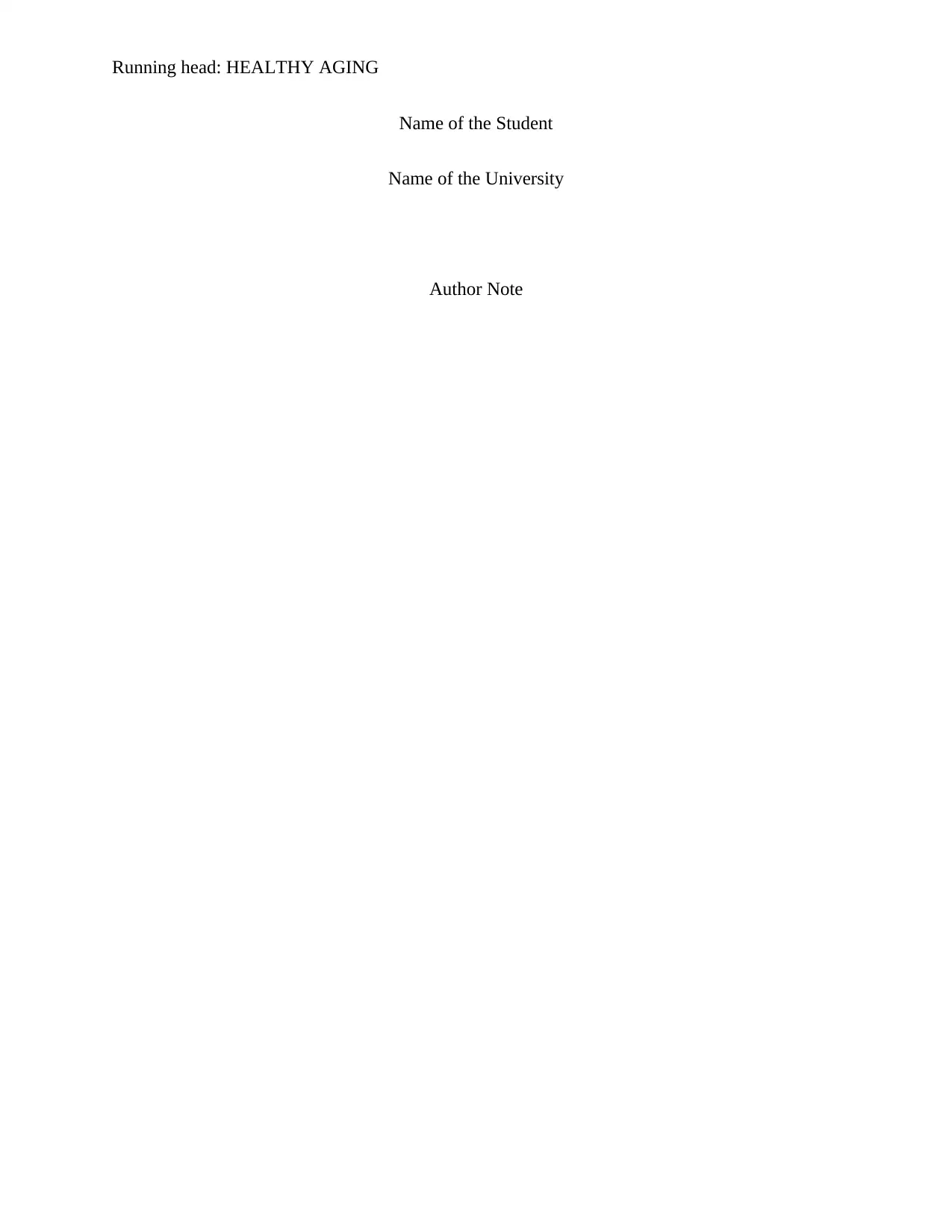
Running head: HEALTHY AGING
Name of the Student
Name of the University
Author Note
Name of the Student
Name of the University
Author Note
Paraphrase This Document
Need a fresh take? Get an instant paraphrase of this document with our AI Paraphraser
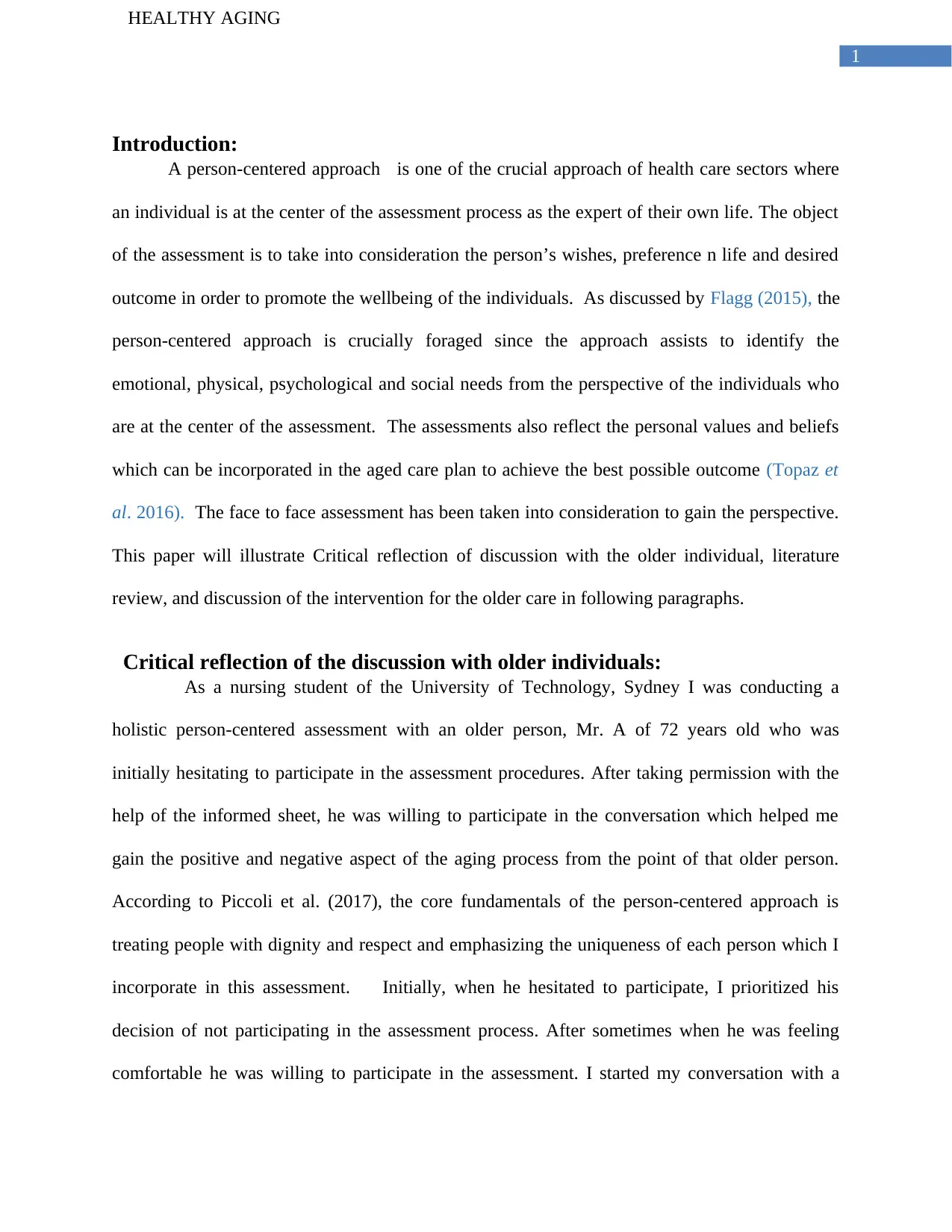
1
HEALTHY AGING
Introduction:
A person-centered approach is one of the crucial approach of health care sectors where
an individual is at the center of the assessment process as the expert of their own life. The object
of the assessment is to take into consideration the person’s wishes, preference n life and desired
outcome in order to promote the wellbeing of the individuals. As discussed by Flagg (2015), the
person-centered approach is crucially foraged since the approach assists to identify the
emotional, physical, psychological and social needs from the perspective of the individuals who
are at the center of the assessment. The assessments also reflect the personal values and beliefs
which can be incorporated in the aged care plan to achieve the best possible outcome (Topaz et
al. 2016). The face to face assessment has been taken into consideration to gain the perspective.
This paper will illustrate Critical reflection of discussion with the older individual, literature
review, and discussion of the intervention for the older care in following paragraphs.
Critical reflection of the discussion with older individuals:
As a nursing student of the University of Technology, Sydney I was conducting a
holistic person-centered assessment with an older person, Mr. A of 72 years old who was
initially hesitating to participate in the assessment procedures. After taking permission with the
help of the informed sheet, he was willing to participate in the conversation which helped me
gain the positive and negative aspect of the aging process from the point of that older person.
According to Piccoli et al. (2017), the core fundamentals of the person-centered approach is
treating people with dignity and respect and emphasizing the uniqueness of each person which I
incorporate in this assessment. Initially, when he hesitated to participate, I prioritized his
decision of not participating in the assessment process. After sometimes when he was feeling
comfortable he was willing to participate in the assessment. I started my conversation with a
HEALTHY AGING
Introduction:
A person-centered approach is one of the crucial approach of health care sectors where
an individual is at the center of the assessment process as the expert of their own life. The object
of the assessment is to take into consideration the person’s wishes, preference n life and desired
outcome in order to promote the wellbeing of the individuals. As discussed by Flagg (2015), the
person-centered approach is crucially foraged since the approach assists to identify the
emotional, physical, psychological and social needs from the perspective of the individuals who
are at the center of the assessment. The assessments also reflect the personal values and beliefs
which can be incorporated in the aged care plan to achieve the best possible outcome (Topaz et
al. 2016). The face to face assessment has been taken into consideration to gain the perspective.
This paper will illustrate Critical reflection of discussion with the older individual, literature
review, and discussion of the intervention for the older care in following paragraphs.
Critical reflection of the discussion with older individuals:
As a nursing student of the University of Technology, Sydney I was conducting a
holistic person-centered assessment with an older person, Mr. A of 72 years old who was
initially hesitating to participate in the assessment procedures. After taking permission with the
help of the informed sheet, he was willing to participate in the conversation which helped me
gain the positive and negative aspect of the aging process from the point of that older person.
According to Piccoli et al. (2017), the core fundamentals of the person-centered approach is
treating people with dignity and respect and emphasizing the uniqueness of each person which I
incorporate in this assessment. Initially, when he hesitated to participate, I prioritized his
decision of not participating in the assessment process. After sometimes when he was feeling
comfortable he was willing to participate in the assessment. I started my conversation with a
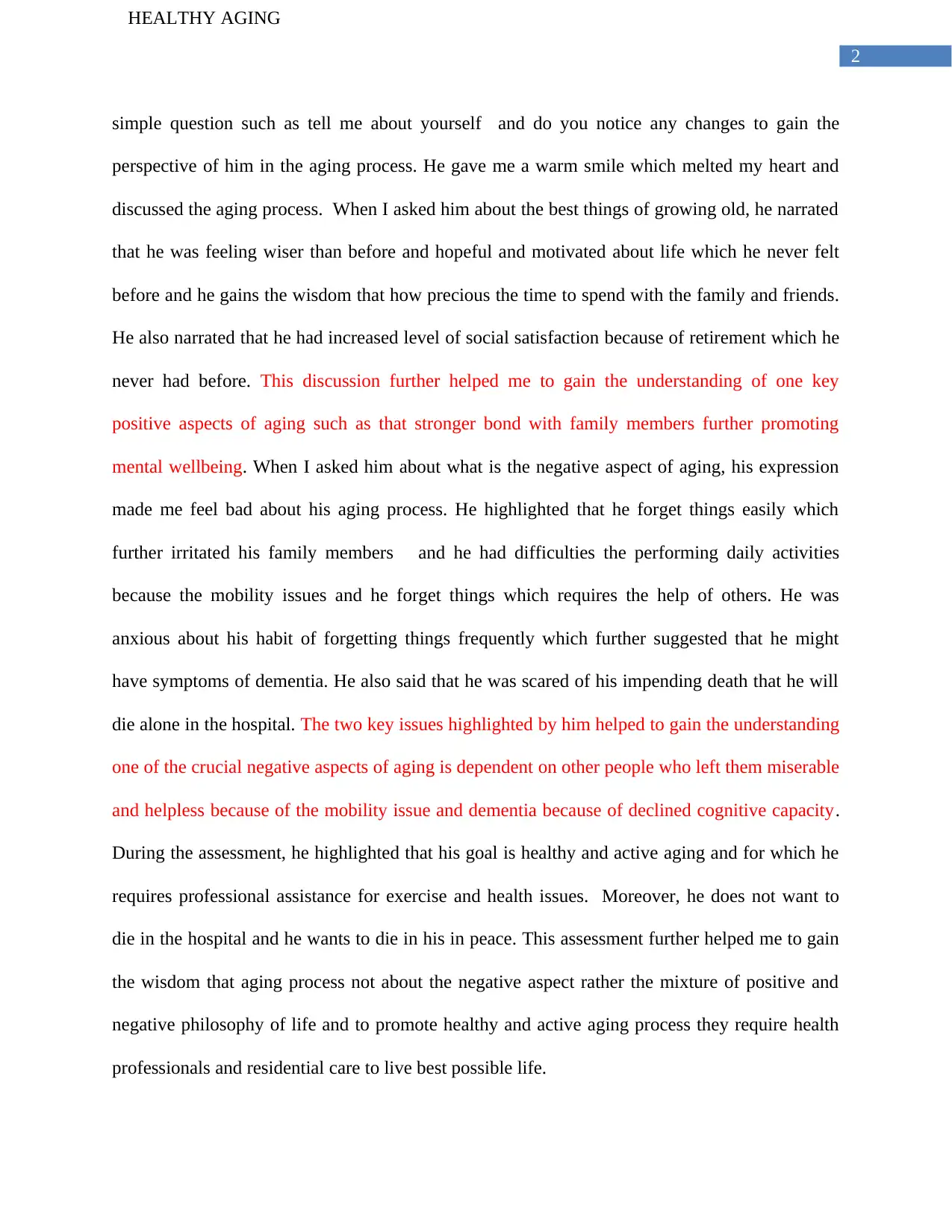
2
HEALTHY AGING
simple question such as tell me about yourself and do you notice any changes to gain the
perspective of him in the aging process. He gave me a warm smile which melted my heart and
discussed the aging process. When I asked him about the best things of growing old, he narrated
that he was feeling wiser than before and hopeful and motivated about life which he never felt
before and he gains the wisdom that how precious the time to spend with the family and friends.
He also narrated that he had increased level of social satisfaction because of retirement which he
never had before. This discussion further helped me to gain the understanding of one key
positive aspects of aging such as that stronger bond with family members further promoting
mental wellbeing. When I asked him about what is the negative aspect of aging, his expression
made me feel bad about his aging process. He highlighted that he forget things easily which
further irritated his family members and he had difficulties the performing daily activities
because the mobility issues and he forget things which requires the help of others. He was
anxious about his habit of forgetting things frequently which further suggested that he might
have symptoms of dementia. He also said that he was scared of his impending death that he will
die alone in the hospital. The two key issues highlighted by him helped to gain the understanding
one of the crucial negative aspects of aging is dependent on other people who left them miserable
and helpless because of the mobility issue and dementia because of declined cognitive capacity.
During the assessment, he highlighted that his goal is healthy and active aging and for which he
requires professional assistance for exercise and health issues. Moreover, he does not want to
die in the hospital and he wants to die in his in peace. This assessment further helped me to gain
the wisdom that aging process not about the negative aspect rather the mixture of positive and
negative philosophy of life and to promote healthy and active aging process they require health
professionals and residential care to live best possible life.
HEALTHY AGING
simple question such as tell me about yourself and do you notice any changes to gain the
perspective of him in the aging process. He gave me a warm smile which melted my heart and
discussed the aging process. When I asked him about the best things of growing old, he narrated
that he was feeling wiser than before and hopeful and motivated about life which he never felt
before and he gains the wisdom that how precious the time to spend with the family and friends.
He also narrated that he had increased level of social satisfaction because of retirement which he
never had before. This discussion further helped me to gain the understanding of one key
positive aspects of aging such as that stronger bond with family members further promoting
mental wellbeing. When I asked him about what is the negative aspect of aging, his expression
made me feel bad about his aging process. He highlighted that he forget things easily which
further irritated his family members and he had difficulties the performing daily activities
because the mobility issues and he forget things which requires the help of others. He was
anxious about his habit of forgetting things frequently which further suggested that he might
have symptoms of dementia. He also said that he was scared of his impending death that he will
die alone in the hospital. The two key issues highlighted by him helped to gain the understanding
one of the crucial negative aspects of aging is dependent on other people who left them miserable
and helpless because of the mobility issue and dementia because of declined cognitive capacity.
During the assessment, he highlighted that his goal is healthy and active aging and for which he
requires professional assistance for exercise and health issues. Moreover, he does not want to
die in the hospital and he wants to die in his in peace. This assessment further helped me to gain
the wisdom that aging process not about the negative aspect rather the mixture of positive and
negative philosophy of life and to promote healthy and active aging process they require health
professionals and residential care to live best possible life.
⊘ This is a preview!⊘
Do you want full access?
Subscribe today to unlock all pages.

Trusted by 1+ million students worldwide
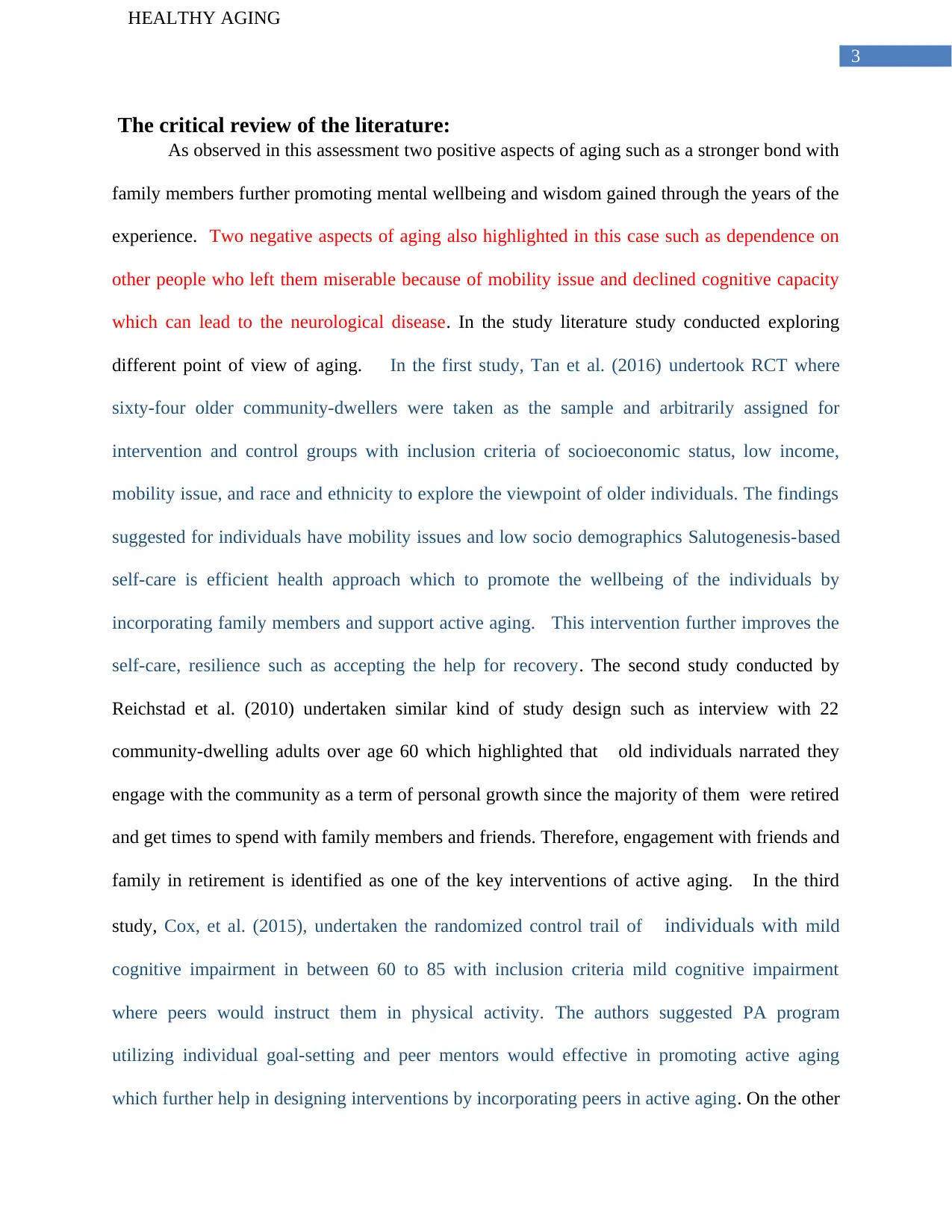
3
HEALTHY AGING
The critical review of the literature:
As observed in this assessment two positive aspects of aging such as a stronger bond with
family members further promoting mental wellbeing and wisdom gained through the years of the
experience. Two negative aspects of aging also highlighted in this case such as dependence on
other people who left them miserable because of mobility issue and declined cognitive capacity
which can lead to the neurological disease. In the study literature study conducted exploring
different point of view of aging. In the first study, Tan et al. (2016) undertook RCT where
sixty-four older community-dwellers were taken as the sample and arbitrarily assigned for
intervention and control groups with inclusion criteria of socioeconomic status, low income,
mobility issue, and race and ethnicity to explore the viewpoint of older individuals. The findings
suggested for individuals have mobility issues and low socio demographics Salutogenesis-based
self-care is efficient health approach which to promote the wellbeing of the individuals by
incorporating family members and support active aging. This intervention further improves the
self-care, resilience such as accepting the help for recovery. The second study conducted by
Reichstad et al. (2010) undertaken similar kind of study design such as interview with 22
community-dwelling adults over age 60 which highlighted that old individuals narrated they
engage with the community as a term of personal growth since the majority of them were retired
and get times to spend with family members and friends. Therefore, engagement with friends and
family in retirement is identified as one of the key interventions of active aging. In the third
study, Cox, et al. (2015), undertaken the randomized control trail of individuals with mild
cognitive impairment in between 60 to 85 with inclusion criteria mild cognitive impairment
where peers would instruct them in physical activity. The authors suggested PA program
utilizing individual goal-setting and peer mentors would effective in promoting active aging
which further help in designing interventions by incorporating peers in active aging. On the other
HEALTHY AGING
The critical review of the literature:
As observed in this assessment two positive aspects of aging such as a stronger bond with
family members further promoting mental wellbeing and wisdom gained through the years of the
experience. Two negative aspects of aging also highlighted in this case such as dependence on
other people who left them miserable because of mobility issue and declined cognitive capacity
which can lead to the neurological disease. In the study literature study conducted exploring
different point of view of aging. In the first study, Tan et al. (2016) undertook RCT where
sixty-four older community-dwellers were taken as the sample and arbitrarily assigned for
intervention and control groups with inclusion criteria of socioeconomic status, low income,
mobility issue, and race and ethnicity to explore the viewpoint of older individuals. The findings
suggested for individuals have mobility issues and low socio demographics Salutogenesis-based
self-care is efficient health approach which to promote the wellbeing of the individuals by
incorporating family members and support active aging. This intervention further improves the
self-care, resilience such as accepting the help for recovery. The second study conducted by
Reichstad et al. (2010) undertaken similar kind of study design such as interview with 22
community-dwelling adults over age 60 which highlighted that old individuals narrated they
engage with the community as a term of personal growth since the majority of them were retired
and get times to spend with family members and friends. Therefore, engagement with friends and
family in retirement is identified as one of the key interventions of active aging. In the third
study, Cox, et al. (2015), undertaken the randomized control trail of individuals with mild
cognitive impairment in between 60 to 85 with inclusion criteria mild cognitive impairment
where peers would instruct them in physical activity. The authors suggested PA program
utilizing individual goal-setting and peer mentors would effective in promoting active aging
which further help in designing interventions by incorporating peers in active aging. On the other
Paraphrase This Document
Need a fresh take? Get an instant paraphrase of this document with our AI Paraphraser
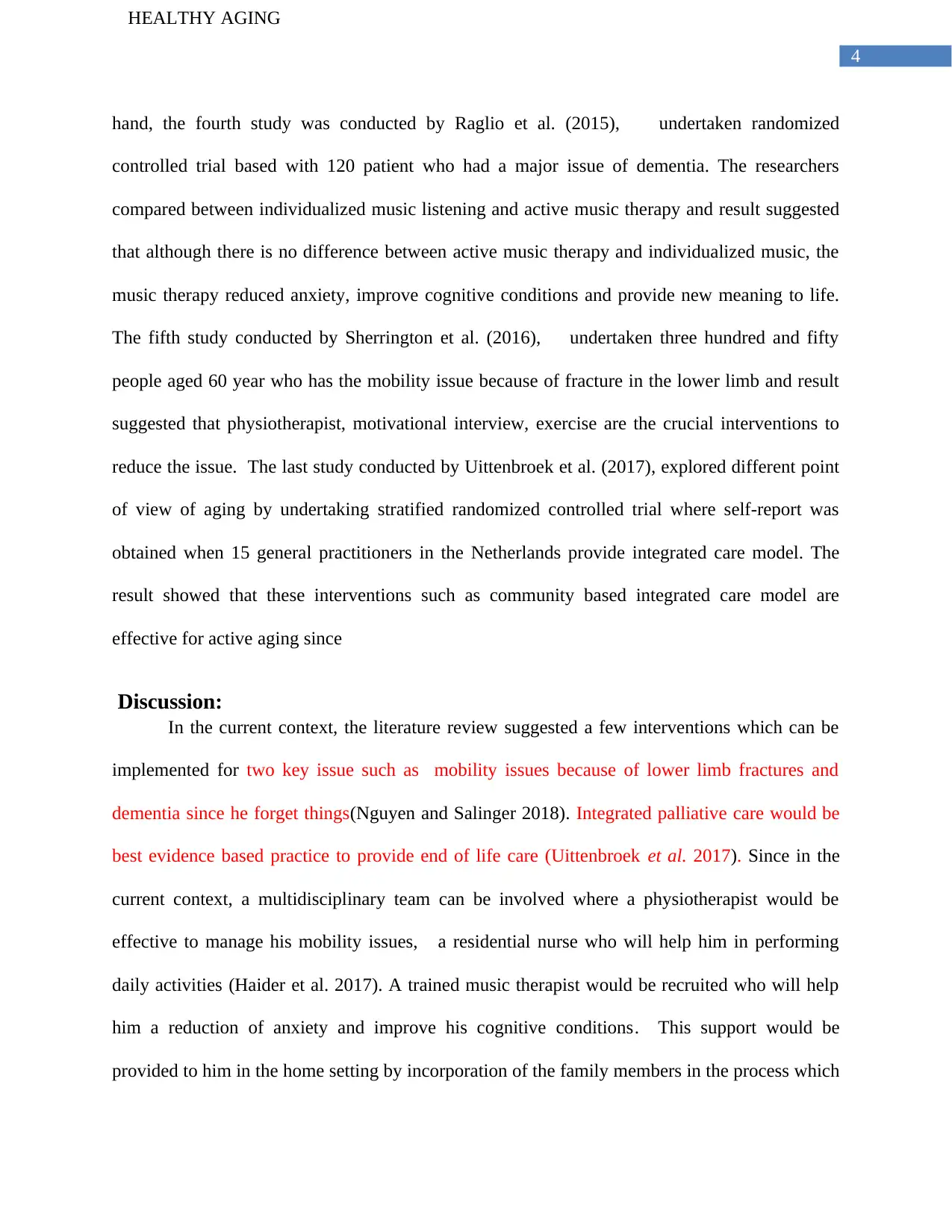
4
HEALTHY AGING
hand, the fourth study was conducted by Raglio et al. (2015), undertaken randomized
controlled trial based with 120 patient who had a major issue of dementia. The researchers
compared between individualized music listening and active music therapy and result suggested
that although there is no difference between active music therapy and individualized music, the
music therapy reduced anxiety, improve cognitive conditions and provide new meaning to life.
The fifth study conducted by Sherrington et al. (2016), undertaken three hundred and fifty
people aged 60 year who has the mobility issue because of fracture in the lower limb and result
suggested that physiotherapist, motivational interview, exercise are the crucial interventions to
reduce the issue. The last study conducted by Uittenbroek et al. (2017), explored different point
of view of aging by undertaking stratified randomized controlled trial where self-report was
obtained when 15 general practitioners in the Netherlands provide integrated care model. The
result showed that these interventions such as community based integrated care model are
effective for active aging since
Discussion:
In the current context, the literature review suggested a few interventions which can be
implemented for two key issue such as mobility issues because of lower limb fractures and
dementia since he forget things(Nguyen and Salinger 2018). Integrated palliative care would be
best evidence based practice to provide end of life care (Uittenbroek et al. 2017). Since in the
current context, a multidisciplinary team can be involved where a physiotherapist would be
effective to manage his mobility issues, a residential nurse who will help him in performing
daily activities (Haider et al. 2017). A trained music therapist would be recruited who will help
him a reduction of anxiety and improve his cognitive conditions. This support would be
provided to him in the home setting by incorporation of the family members in the process which
HEALTHY AGING
hand, the fourth study was conducted by Raglio et al. (2015), undertaken randomized
controlled trial based with 120 patient who had a major issue of dementia. The researchers
compared between individualized music listening and active music therapy and result suggested
that although there is no difference between active music therapy and individualized music, the
music therapy reduced anxiety, improve cognitive conditions and provide new meaning to life.
The fifth study conducted by Sherrington et al. (2016), undertaken three hundred and fifty
people aged 60 year who has the mobility issue because of fracture in the lower limb and result
suggested that physiotherapist, motivational interview, exercise are the crucial interventions to
reduce the issue. The last study conducted by Uittenbroek et al. (2017), explored different point
of view of aging by undertaking stratified randomized controlled trial where self-report was
obtained when 15 general practitioners in the Netherlands provide integrated care model. The
result showed that these interventions such as community based integrated care model are
effective for active aging since
Discussion:
In the current context, the literature review suggested a few interventions which can be
implemented for two key issue such as mobility issues because of lower limb fractures and
dementia since he forget things(Nguyen and Salinger 2018). Integrated palliative care would be
best evidence based practice to provide end of life care (Uittenbroek et al. 2017). Since in the
current context, a multidisciplinary team can be involved where a physiotherapist would be
effective to manage his mobility issues, a residential nurse who will help him in performing
daily activities (Haider et al. 2017). A trained music therapist would be recruited who will help
him a reduction of anxiety and improve his cognitive conditions. This support would be
provided to him in the home setting by incorporation of the family members in the process which
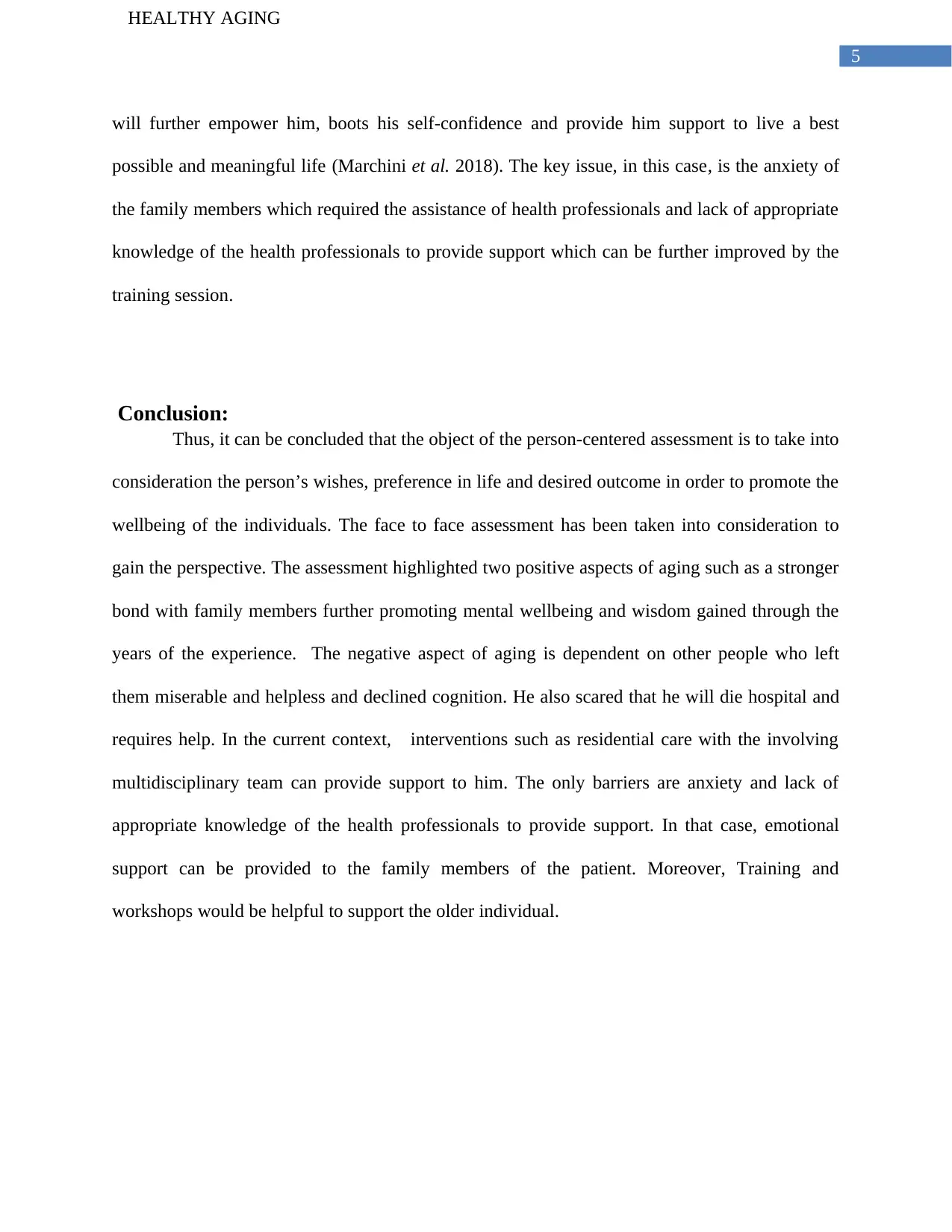
5
HEALTHY AGING
will further empower him, boots his self-confidence and provide him support to live a best
possible and meaningful life (Marchini et al. 2018). The key issue, in this case, is the anxiety of
the family members which required the assistance of health professionals and lack of appropriate
knowledge of the health professionals to provide support which can be further improved by the
training session.
Conclusion:
Thus, it can be concluded that the object of the person-centered assessment is to take into
consideration the person’s wishes, preference in life and desired outcome in order to promote the
wellbeing of the individuals. The face to face assessment has been taken into consideration to
gain the perspective. The assessment highlighted two positive aspects of aging such as a stronger
bond with family members further promoting mental wellbeing and wisdom gained through the
years of the experience. The negative aspect of aging is dependent on other people who left
them miserable and helpless and declined cognition. He also scared that he will die hospital and
requires help. In the current context, interventions such as residential care with the involving
multidisciplinary team can provide support to him. The only barriers are anxiety and lack of
appropriate knowledge of the health professionals to provide support. In that case, emotional
support can be provided to the family members of the patient. Moreover, Training and
workshops would be helpful to support the older individual.
HEALTHY AGING
will further empower him, boots his self-confidence and provide him support to live a best
possible and meaningful life (Marchini et al. 2018). The key issue, in this case, is the anxiety of
the family members which required the assistance of health professionals and lack of appropriate
knowledge of the health professionals to provide support which can be further improved by the
training session.
Conclusion:
Thus, it can be concluded that the object of the person-centered assessment is to take into
consideration the person’s wishes, preference in life and desired outcome in order to promote the
wellbeing of the individuals. The face to face assessment has been taken into consideration to
gain the perspective. The assessment highlighted two positive aspects of aging such as a stronger
bond with family members further promoting mental wellbeing and wisdom gained through the
years of the experience. The negative aspect of aging is dependent on other people who left
them miserable and helpless and declined cognition. He also scared that he will die hospital and
requires help. In the current context, interventions such as residential care with the involving
multidisciplinary team can provide support to him. The only barriers are anxiety and lack of
appropriate knowledge of the health professionals to provide support. In that case, emotional
support can be provided to the family members of the patient. Moreover, Training and
workshops would be helpful to support the older individual.
⊘ This is a preview!⊘
Do you want full access?
Subscribe today to unlock all pages.

Trusted by 1+ million students worldwide
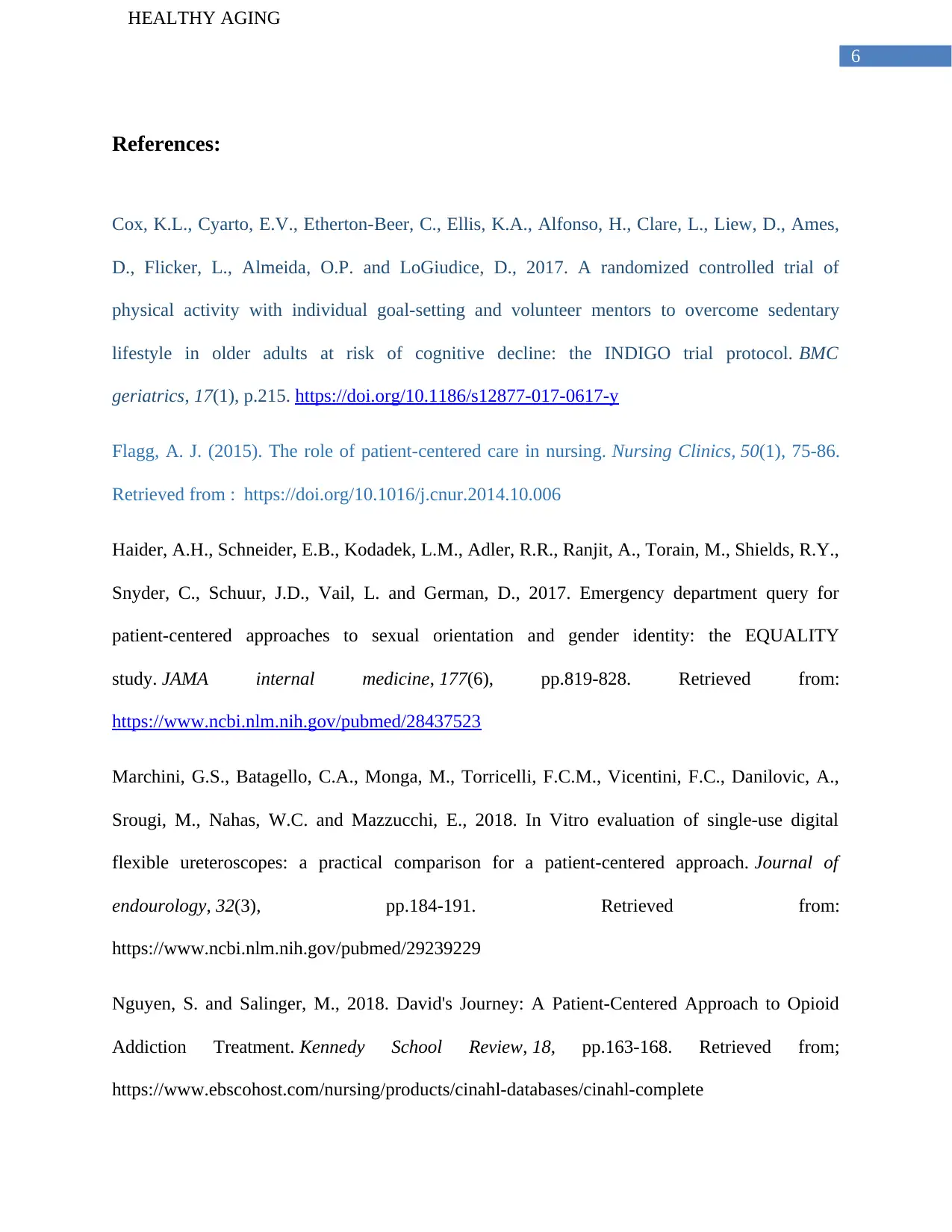
6
HEALTHY AGING
References:
Cox, K.L., Cyarto, E.V., Etherton-Beer, C., Ellis, K.A., Alfonso, H., Clare, L., Liew, D., Ames,
D., Flicker, L., Almeida, O.P. and LoGiudice, D., 2017. A randomized controlled trial of
physical activity with individual goal-setting and volunteer mentors to overcome sedentary
lifestyle in older adults at risk of cognitive decline: the INDIGO trial protocol. BMC
geriatrics, 17(1), p.215. https://doi.org/10.1186/s12877-017-0617-y
Flagg, A. J. (2015). The role of patient-centered care in nursing. Nursing Clinics, 50(1), 75-86.
Retrieved from : https://doi.org/10.1016/j.cnur.2014.10.006
Haider, A.H., Schneider, E.B., Kodadek, L.M., Adler, R.R., Ranjit, A., Torain, M., Shields, R.Y.,
Snyder, C., Schuur, J.D., Vail, L. and German, D., 2017. Emergency department query for
patient-centered approaches to sexual orientation and gender identity: the EQUALITY
study. JAMA internal medicine, 177(6), pp.819-828. Retrieved from:
https://www.ncbi.nlm.nih.gov/pubmed/28437523
Marchini, G.S., Batagello, C.A., Monga, M., Torricelli, F.C.M., Vicentini, F.C., Danilovic, A.,
Srougi, M., Nahas, W.C. and Mazzucchi, E., 2018. In Vitro evaluation of single-use digital
flexible ureteroscopes: a practical comparison for a patient-centered approach. Journal of
endourology, 32(3), pp.184-191. Retrieved from:
https://www.ncbi.nlm.nih.gov/pubmed/29239229
Nguyen, S. and Salinger, M., 2018. David's Journey: A Patient-Centered Approach to Opioid
Addiction Treatment. Kennedy School Review, 18, pp.163-168. Retrieved from;
https://www.ebscohost.com/nursing/products/cinahl-databases/cinahl-complete
HEALTHY AGING
References:
Cox, K.L., Cyarto, E.V., Etherton-Beer, C., Ellis, K.A., Alfonso, H., Clare, L., Liew, D., Ames,
D., Flicker, L., Almeida, O.P. and LoGiudice, D., 2017. A randomized controlled trial of
physical activity with individual goal-setting and volunteer mentors to overcome sedentary
lifestyle in older adults at risk of cognitive decline: the INDIGO trial protocol. BMC
geriatrics, 17(1), p.215. https://doi.org/10.1186/s12877-017-0617-y
Flagg, A. J. (2015). The role of patient-centered care in nursing. Nursing Clinics, 50(1), 75-86.
Retrieved from : https://doi.org/10.1016/j.cnur.2014.10.006
Haider, A.H., Schneider, E.B., Kodadek, L.M., Adler, R.R., Ranjit, A., Torain, M., Shields, R.Y.,
Snyder, C., Schuur, J.D., Vail, L. and German, D., 2017. Emergency department query for
patient-centered approaches to sexual orientation and gender identity: the EQUALITY
study. JAMA internal medicine, 177(6), pp.819-828. Retrieved from:
https://www.ncbi.nlm.nih.gov/pubmed/28437523
Marchini, G.S., Batagello, C.A., Monga, M., Torricelli, F.C.M., Vicentini, F.C., Danilovic, A.,
Srougi, M., Nahas, W.C. and Mazzucchi, E., 2018. In Vitro evaluation of single-use digital
flexible ureteroscopes: a practical comparison for a patient-centered approach. Journal of
endourology, 32(3), pp.184-191. Retrieved from:
https://www.ncbi.nlm.nih.gov/pubmed/29239229
Nguyen, S. and Salinger, M., 2018. David's Journey: A Patient-Centered Approach to Opioid
Addiction Treatment. Kennedy School Review, 18, pp.163-168. Retrieved from;
https://www.ebscohost.com/nursing/products/cinahl-databases/cinahl-complete
Paraphrase This Document
Need a fresh take? Get an instant paraphrase of this document with our AI Paraphraser
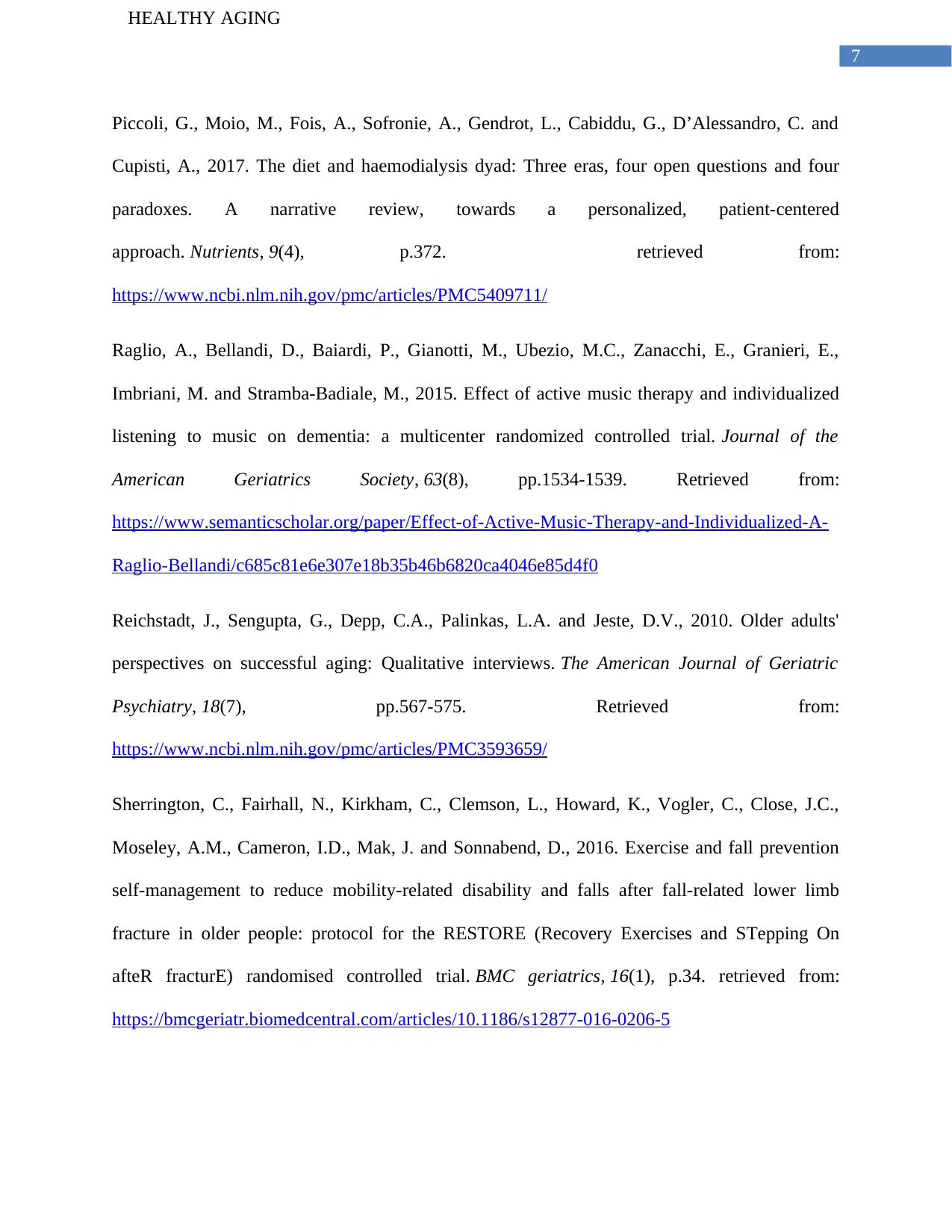
7
HEALTHY AGING
Piccoli, G., Moio, M., Fois, A., Sofronie, A., Gendrot, L., Cabiddu, G., D’Alessandro, C. and
Cupisti, A., 2017. The diet and haemodialysis dyad: Three eras, four open questions and four
paradoxes. A narrative review, towards a personalized, patient-centered
approach. Nutrients, 9(4), p.372. retrieved from:
https://www.ncbi.nlm.nih.gov/pmc/articles/PMC5409711/
Raglio, A., Bellandi, D., Baiardi, P., Gianotti, M., Ubezio, M.C., Zanacchi, E., Granieri, E.,
Imbriani, M. and Stramba‐Badiale, M., 2015. Effect of active music therapy and individualized
listening to music on dementia: a multicenter randomized controlled trial. Journal of the
American Geriatrics Society, 63(8), pp.1534-1539. Retrieved from:
https://www.semanticscholar.org/paper/Effect-of-Active-Music-Therapy-and-Individualized-A-
Raglio-Bellandi/c685c81e6e307e18b35b46b6820ca4046e85d4f0
Reichstadt, J., Sengupta, G., Depp, C.A., Palinkas, L.A. and Jeste, D.V., 2010. Older adults'
perspectives on successful aging: Qualitative interviews. The American Journal of Geriatric
Psychiatry, 18(7), pp.567-575. Retrieved from:
https://www.ncbi.nlm.nih.gov/pmc/articles/PMC3593659/
Sherrington, C., Fairhall, N., Kirkham, C., Clemson, L., Howard, K., Vogler, C., Close, J.C.,
Moseley, A.M., Cameron, I.D., Mak, J. and Sonnabend, D., 2016. Exercise and fall prevention
self-management to reduce mobility-related disability and falls after fall-related lower limb
fracture in older people: protocol for the RESTORE (Recovery Exercises and STepping On
afteR fracturE) randomised controlled trial. BMC geriatrics, 16(1), p.34. retrieved from:
https://bmcgeriatr.biomedcentral.com/articles/10.1186/s12877-016-0206-5
HEALTHY AGING
Piccoli, G., Moio, M., Fois, A., Sofronie, A., Gendrot, L., Cabiddu, G., D’Alessandro, C. and
Cupisti, A., 2017. The diet and haemodialysis dyad: Three eras, four open questions and four
paradoxes. A narrative review, towards a personalized, patient-centered
approach. Nutrients, 9(4), p.372. retrieved from:
https://www.ncbi.nlm.nih.gov/pmc/articles/PMC5409711/
Raglio, A., Bellandi, D., Baiardi, P., Gianotti, M., Ubezio, M.C., Zanacchi, E., Granieri, E.,
Imbriani, M. and Stramba‐Badiale, M., 2015. Effect of active music therapy and individualized
listening to music on dementia: a multicenter randomized controlled trial. Journal of the
American Geriatrics Society, 63(8), pp.1534-1539. Retrieved from:
https://www.semanticscholar.org/paper/Effect-of-Active-Music-Therapy-and-Individualized-A-
Raglio-Bellandi/c685c81e6e307e18b35b46b6820ca4046e85d4f0
Reichstadt, J., Sengupta, G., Depp, C.A., Palinkas, L.A. and Jeste, D.V., 2010. Older adults'
perspectives on successful aging: Qualitative interviews. The American Journal of Geriatric
Psychiatry, 18(7), pp.567-575. Retrieved from:
https://www.ncbi.nlm.nih.gov/pmc/articles/PMC3593659/
Sherrington, C., Fairhall, N., Kirkham, C., Clemson, L., Howard, K., Vogler, C., Close, J.C.,
Moseley, A.M., Cameron, I.D., Mak, J. and Sonnabend, D., 2016. Exercise and fall prevention
self-management to reduce mobility-related disability and falls after fall-related lower limb
fracture in older people: protocol for the RESTORE (Recovery Exercises and STepping On
afteR fracturE) randomised controlled trial. BMC geriatrics, 16(1), p.34. retrieved from:
https://bmcgeriatr.biomedcentral.com/articles/10.1186/s12877-016-0206-5
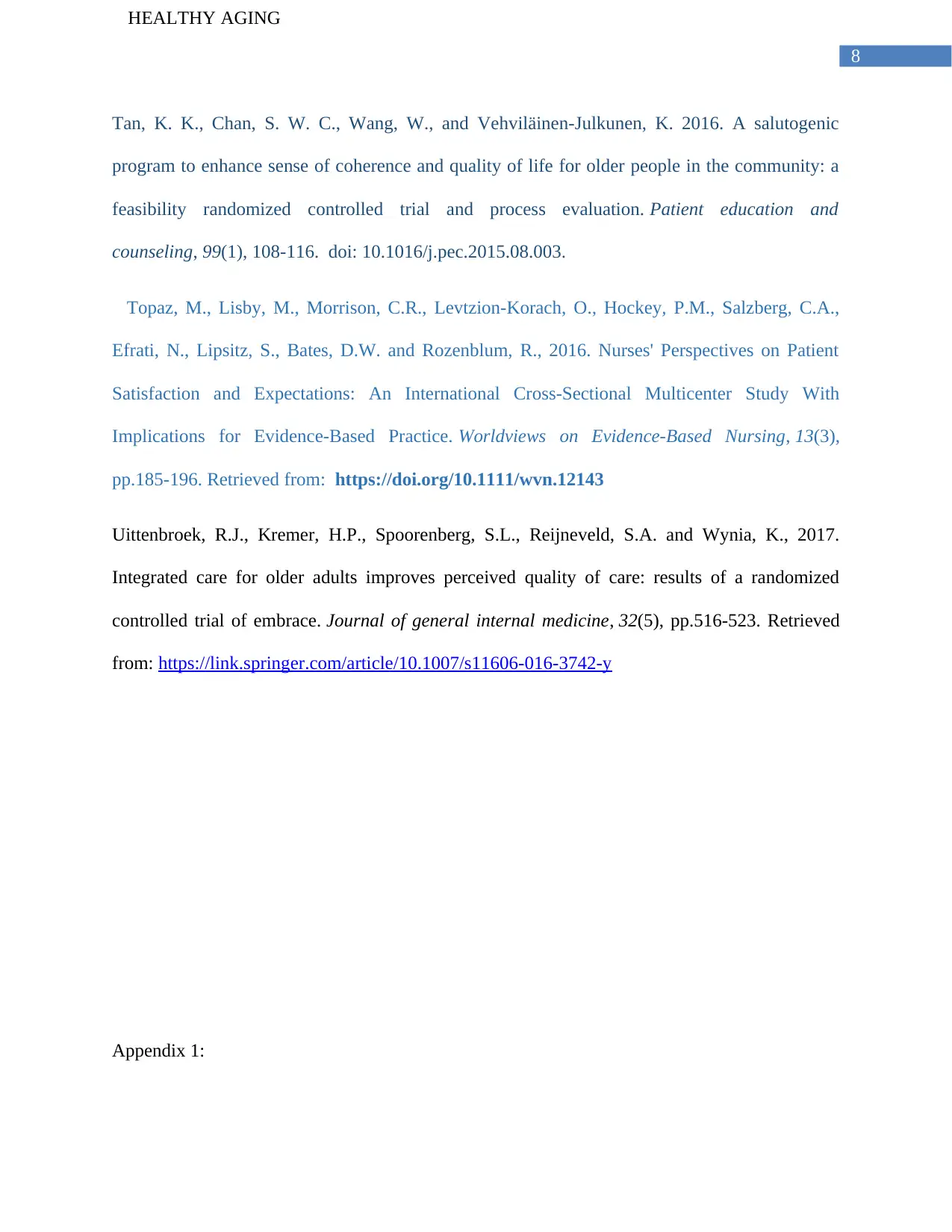
8
HEALTHY AGING
Tan, K. K., Chan, S. W. C., Wang, W., and Vehviläinen-Julkunen, K. 2016. A salutogenic
program to enhance sense of coherence and quality of life for older people in the community: a
feasibility randomized controlled trial and process evaluation. Patient education and
counseling, 99(1), 108-116. doi: 10.1016/j.pec.2015.08.003.
Topaz, M., Lisby, M., Morrison, C.R., Levtzion‐Korach, O., Hockey, P.M., Salzberg, C.A.,
Efrati, N., Lipsitz, S., Bates, D.W. and Rozenblum, R., 2016. Nurses' Perspectives on Patient
Satisfaction and Expectations: An International Cross‐Sectional Multicenter Study With
Implications for Evidence‐Based Practice. Worldviews on Evidence‐Based Nursing, 13(3),
pp.185-196. Retrieved from: https://doi.org/10.1111/wvn.12143
Uittenbroek, R.J., Kremer, H.P., Spoorenberg, S.L., Reijneveld, S.A. and Wynia, K., 2017.
Integrated care for older adults improves perceived quality of care: results of a randomized
controlled trial of embrace. Journal of general internal medicine, 32(5), pp.516-523. Retrieved
from: https://link.springer.com/article/10.1007/s11606-016-3742-y
Appendix 1:
HEALTHY AGING
Tan, K. K., Chan, S. W. C., Wang, W., and Vehviläinen-Julkunen, K. 2016. A salutogenic
program to enhance sense of coherence and quality of life for older people in the community: a
feasibility randomized controlled trial and process evaluation. Patient education and
counseling, 99(1), 108-116. doi: 10.1016/j.pec.2015.08.003.
Topaz, M., Lisby, M., Morrison, C.R., Levtzion‐Korach, O., Hockey, P.M., Salzberg, C.A.,
Efrati, N., Lipsitz, S., Bates, D.W. and Rozenblum, R., 2016. Nurses' Perspectives on Patient
Satisfaction and Expectations: An International Cross‐Sectional Multicenter Study With
Implications for Evidence‐Based Practice. Worldviews on Evidence‐Based Nursing, 13(3),
pp.185-196. Retrieved from: https://doi.org/10.1111/wvn.12143
Uittenbroek, R.J., Kremer, H.P., Spoorenberg, S.L., Reijneveld, S.A. and Wynia, K., 2017.
Integrated care for older adults improves perceived quality of care: results of a randomized
controlled trial of embrace. Journal of general internal medicine, 32(5), pp.516-523. Retrieved
from: https://link.springer.com/article/10.1007/s11606-016-3742-y
Appendix 1:
⊘ This is a preview!⊘
Do you want full access?
Subscribe today to unlock all pages.

Trusted by 1+ million students worldwide
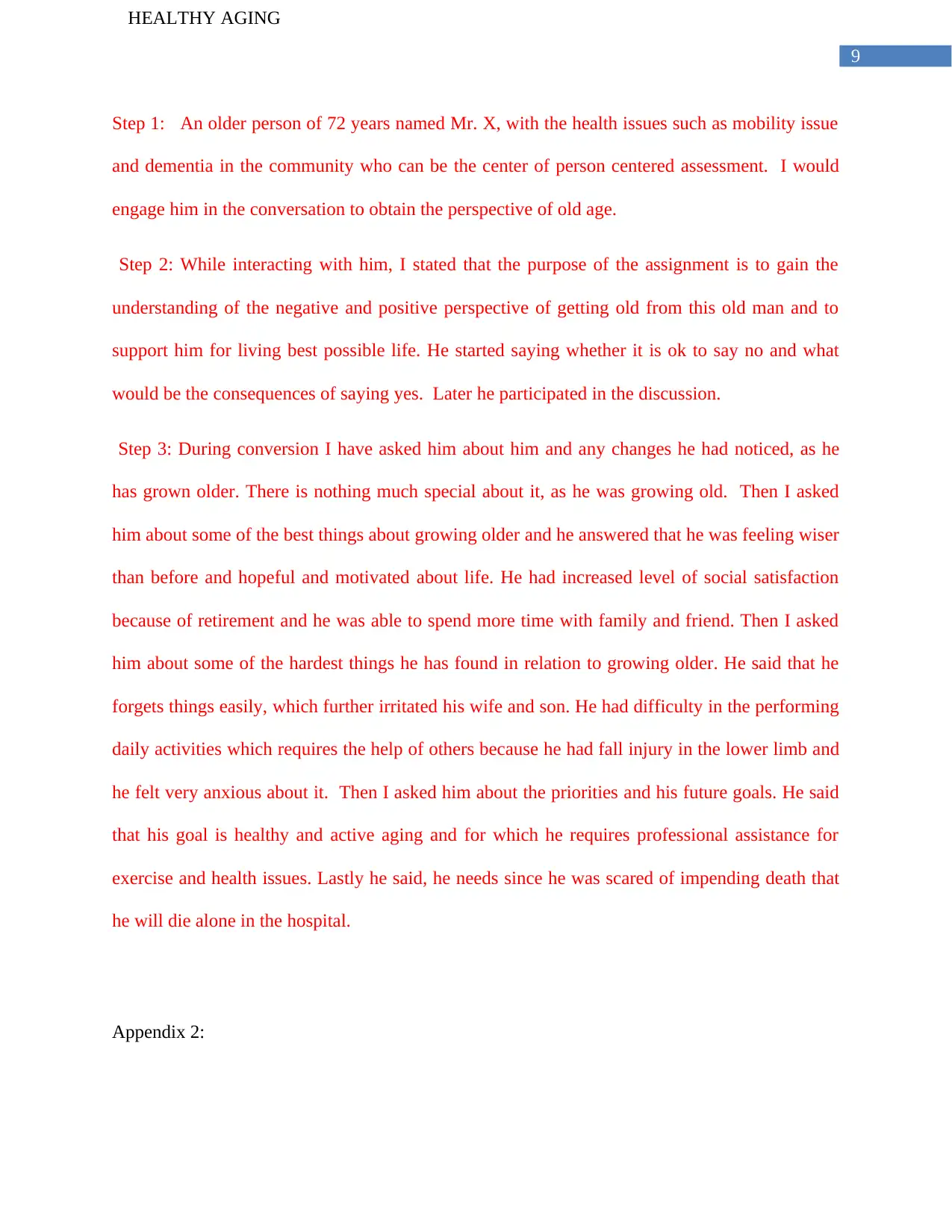
9
HEALTHY AGING
Step 1: An older person of 72 years named Mr. X, with the health issues such as mobility issue
and dementia in the community who can be the center of person centered assessment. I would
engage him in the conversation to obtain the perspective of old age.
Step 2: While interacting with him, I stated that the purpose of the assignment is to gain the
understanding of the negative and positive perspective of getting old from this old man and to
support him for living best possible life. He started saying whether it is ok to say no and what
would be the consequences of saying yes. Later he participated in the discussion.
Step 3: During conversion I have asked him about him and any changes he had noticed, as he
has grown older. There is nothing much special about it, as he was growing old. Then I asked
him about some of the best things about growing older and he answered that he was feeling wiser
than before and hopeful and motivated about life. He had increased level of social satisfaction
because of retirement and he was able to spend more time with family and friend. Then I asked
him about some of the hardest things he has found in relation to growing older. He said that he
forgets things easily, which further irritated his wife and son. He had difficulty in the performing
daily activities which requires the help of others because he had fall injury in the lower limb and
he felt very anxious about it. Then I asked him about the priorities and his future goals. He said
that his goal is healthy and active aging and for which he requires professional assistance for
exercise and health issues. Lastly he said, he needs since he was scared of impending death that
he will die alone in the hospital.
Appendix 2:
HEALTHY AGING
Step 1: An older person of 72 years named Mr. X, with the health issues such as mobility issue
and dementia in the community who can be the center of person centered assessment. I would
engage him in the conversation to obtain the perspective of old age.
Step 2: While interacting with him, I stated that the purpose of the assignment is to gain the
understanding of the negative and positive perspective of getting old from this old man and to
support him for living best possible life. He started saying whether it is ok to say no and what
would be the consequences of saying yes. Later he participated in the discussion.
Step 3: During conversion I have asked him about him and any changes he had noticed, as he
has grown older. There is nothing much special about it, as he was growing old. Then I asked
him about some of the best things about growing older and he answered that he was feeling wiser
than before and hopeful and motivated about life. He had increased level of social satisfaction
because of retirement and he was able to spend more time with family and friend. Then I asked
him about some of the hardest things he has found in relation to growing older. He said that he
forgets things easily, which further irritated his wife and son. He had difficulty in the performing
daily activities which requires the help of others because he had fall injury in the lower limb and
he felt very anxious about it. Then I asked him about the priorities and his future goals. He said
that his goal is healthy and active aging and for which he requires professional assistance for
exercise and health issues. Lastly he said, he needs since he was scared of impending death that
he will die alone in the hospital.
Appendix 2:
Paraphrase This Document
Need a fresh take? Get an instant paraphrase of this document with our AI Paraphraser
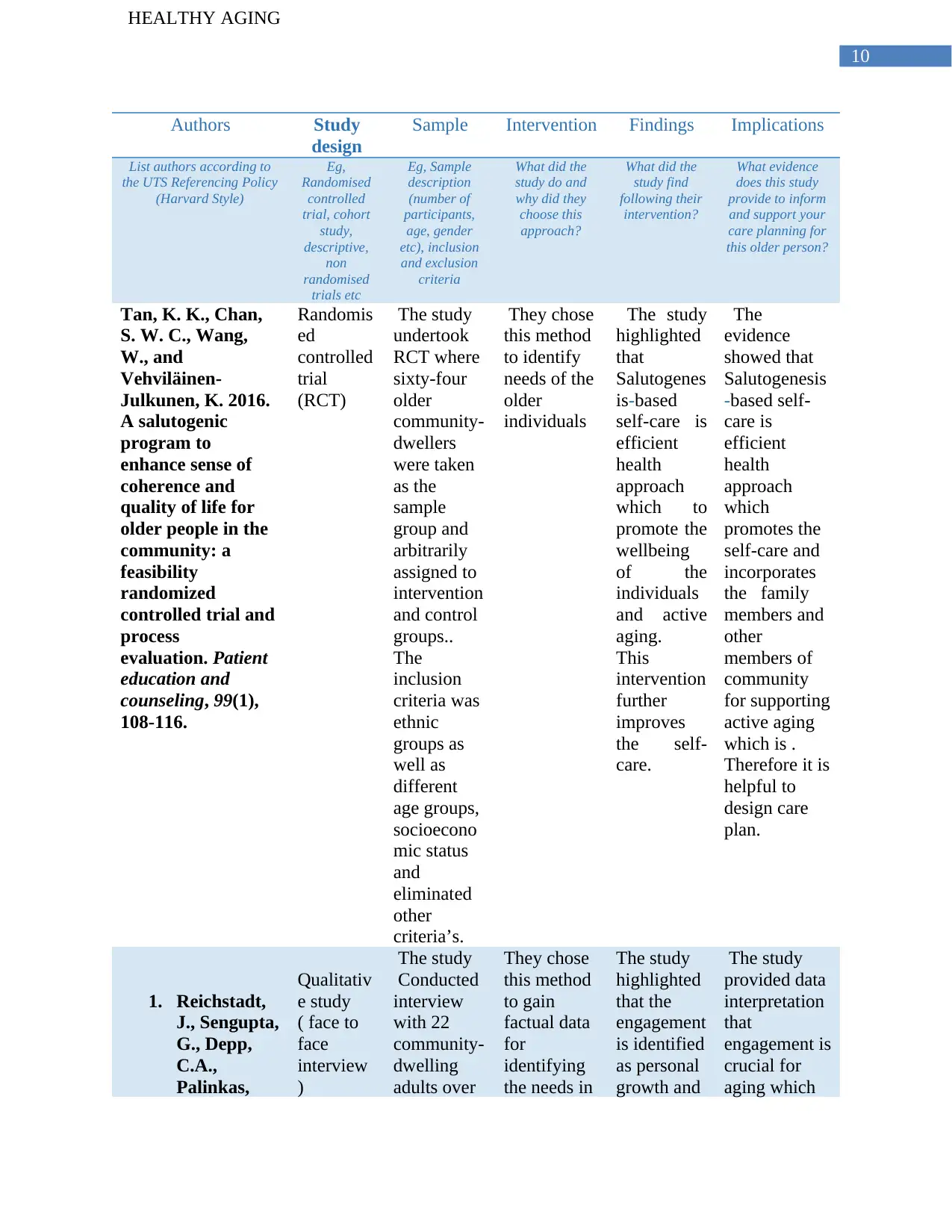
10
HEALTHY AGING
Authors Study
design
Sample Intervention Findings Implications
List authors according to
the UTS Referencing Policy
(Harvard Style)
Eg,
Randomised
controlled
trial, cohort
study,
descriptive,
non
randomised
trials etc
Eg, Sample
description
(number of
participants,
age, gender
etc), inclusion
and exclusion
criteria
What did the
study do and
why did they
choose this
approach?
What did the
study find
following their
intervention?
What evidence
does this study
provide to inform
and support your
care planning for
this older person?
Tan, K. K., Chan,
S. W. C., Wang,
W., and
Vehviläinen-
Julkunen, K. 2016.
A salutogenic
program to
enhance sense of
coherence and
quality of life for
older people in the
community: a
feasibility
randomized
controlled trial and
process
evaluation. Patient
education and
counseling, 99(1),
108-116.
Randomis
ed
controlled
trial
(RCT)
The study
undertook
RCT where
sixty-four
older
community-
dwellers
were taken
as the
sample
group and
arbitrarily
assigned to
intervention
and control
groups..
The
inclusion
criteria was
ethnic
groups as
well as
different
age groups,
socioecono
mic status
and
eliminated
other
criteria’s.
They chose
this method
to identify
needs of the
older
individuals
The study
highlighted
that
Salutogenes
is-based
self-care is
efficient
health
approach
which to
promote the
wellbeing
of the
individuals
and active
aging.
This
intervention
further
improves
the self-
care.
The
evidence
showed that
Salutogenesis
-based self-
care is
efficient
health
approach
which
promotes the
self-care and
incorporates
the family
members and
other
members of
community
for supporting
active aging
which is .
Therefore it is
helpful to
design care
plan.
1. Reichstadt,
J., Sengupta,
G., Depp,
C.A.,
Palinkas,
Qualitativ
e study
( face to
face
interview
)
The study
Conducted
interview
with 22
community-
dwelling
adults over
They chose
this method
to gain
factual data
for
identifying
the needs in
The study
highlighted
that the
engagement
is identified
as personal
growth and
The study
provided data
interpretation
that
engagement is
crucial for
aging which
HEALTHY AGING
Authors Study
design
Sample Intervention Findings Implications
List authors according to
the UTS Referencing Policy
(Harvard Style)
Eg,
Randomised
controlled
trial, cohort
study,
descriptive,
non
randomised
trials etc
Eg, Sample
description
(number of
participants,
age, gender
etc), inclusion
and exclusion
criteria
What did the
study do and
why did they
choose this
approach?
What did the
study find
following their
intervention?
What evidence
does this study
provide to inform
and support your
care planning for
this older person?
Tan, K. K., Chan,
S. W. C., Wang,
W., and
Vehviläinen-
Julkunen, K. 2016.
A salutogenic
program to
enhance sense of
coherence and
quality of life for
older people in the
community: a
feasibility
randomized
controlled trial and
process
evaluation. Patient
education and
counseling, 99(1),
108-116.
Randomis
ed
controlled
trial
(RCT)
The study
undertook
RCT where
sixty-four
older
community-
dwellers
were taken
as the
sample
group and
arbitrarily
assigned to
intervention
and control
groups..
The
inclusion
criteria was
ethnic
groups as
well as
different
age groups,
socioecono
mic status
and
eliminated
other
criteria’s.
They chose
this method
to identify
needs of the
older
individuals
The study
highlighted
that
Salutogenes
is-based
self-care is
efficient
health
approach
which to
promote the
wellbeing
of the
individuals
and active
aging.
This
intervention
further
improves
the self-
care.
The
evidence
showed that
Salutogenesis
-based self-
care is
efficient
health
approach
which
promotes the
self-care and
incorporates
the family
members and
other
members of
community
for supporting
active aging
which is .
Therefore it is
helpful to
design care
plan.
1. Reichstadt,
J., Sengupta,
G., Depp,
C.A.,
Palinkas,
Qualitativ
e study
( face to
face
interview
)
The study
Conducted
interview
with 22
community-
dwelling
adults over
They chose
this method
to gain
factual data
for
identifying
the needs in
The study
highlighted
that the
engagement
is identified
as personal
growth and
The study
provided data
interpretation
that
engagement is
crucial for
aging which
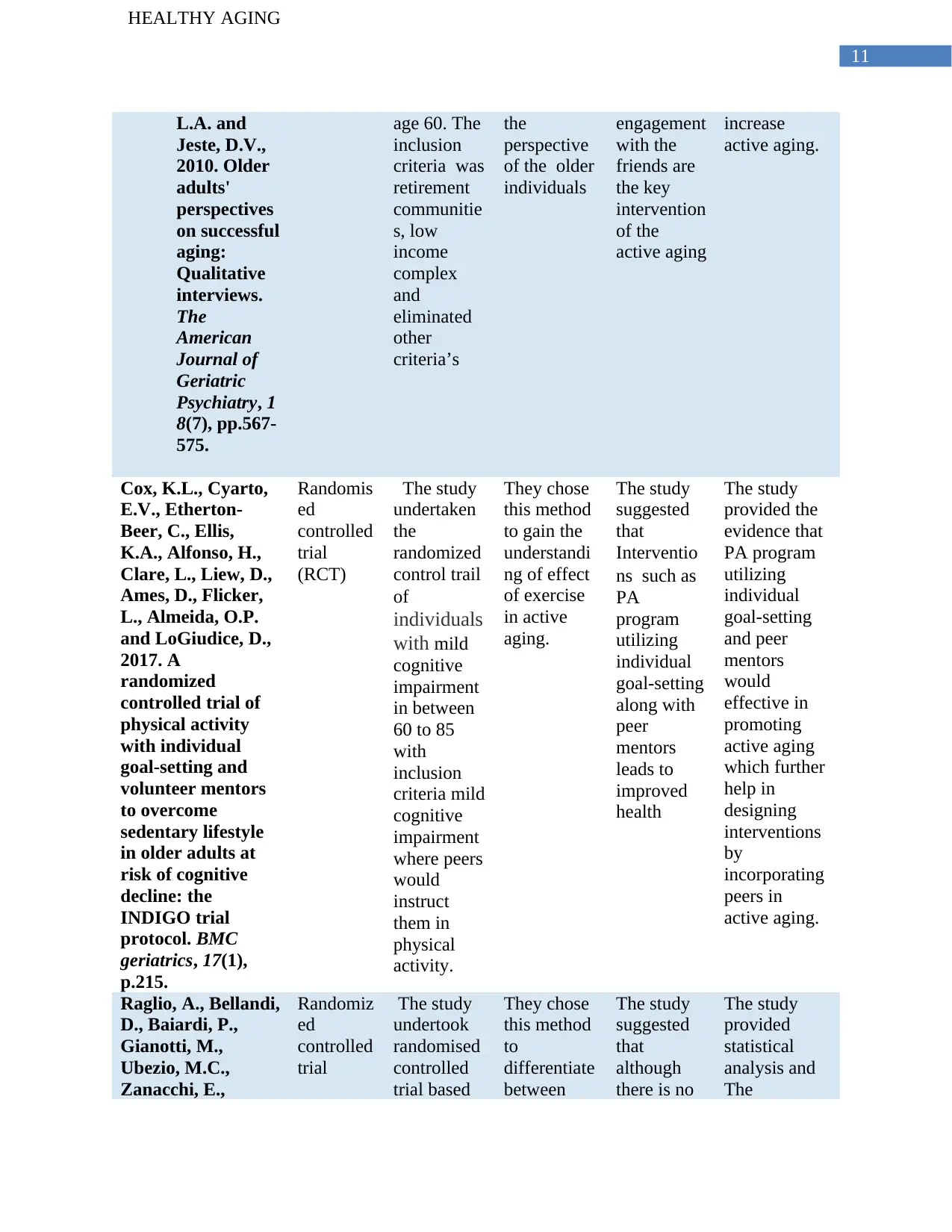
11
HEALTHY AGING
L.A. and
Jeste, D.V.,
2010. Older
adults'
perspectives
on successful
aging:
Qualitative
interviews.
The
American
Journal of
Geriatric
Psychiatry, 1
8(7), pp.567-
575.
age 60. The
inclusion
criteria was
retirement
communitie
s, low
income
complex
and
eliminated
other
criteria’s
the
perspective
of the older
individuals
engagement
with the
friends are
the key
intervention
of the
active aging
increase
active aging.
Cox, K.L., Cyarto,
E.V., Etherton-
Beer, C., Ellis,
K.A., Alfonso, H.,
Clare, L., Liew, D.,
Ames, D., Flicker,
L., Almeida, O.P.
and LoGiudice, D.,
2017. A
randomized
controlled trial of
physical activity
with individual
goal-setting and
volunteer mentors
to overcome
sedentary lifestyle
in older adults at
risk of cognitive
decline: the
INDIGO trial
protocol. BMC
geriatrics, 17(1),
p.215.
Randomis
ed
controlled
trial
(RCT)
The study
undertaken
the
randomized
control trail
of
individuals
with mild
cognitive
impairment
in between
60 to 85
with
inclusion
criteria mild
cognitive
impairment
where peers
would
instruct
them in
physical
activity.
They chose
this method
to gain the
understandi
ng of effect
of exercise
in active
aging.
The study
suggested
that
Interventio
ns such as
PA
program
utilizing
individual
goal-setting
along with
peer
mentors
leads to
improved
health
The study
provided the
evidence that
PA program
utilizing
individual
goal-setting
and peer
mentors
would
effective in
promoting
active aging
which further
help in
designing
interventions
by
incorporating
peers in
active aging.
Raglio, A., Bellandi,
D., Baiardi, P.,
Gianotti, M.,
Ubezio, M.C.,
Zanacchi, E.,
Randomiz
ed
controlled
trial
The study
undertook
randomised
controlled
trial based
They chose
this method
to
differentiate
between
The study
suggested
that
although
there is no
The study
provided
statistical
analysis and
The
HEALTHY AGING
L.A. and
Jeste, D.V.,
2010. Older
adults'
perspectives
on successful
aging:
Qualitative
interviews.
The
American
Journal of
Geriatric
Psychiatry, 1
8(7), pp.567-
575.
age 60. The
inclusion
criteria was
retirement
communitie
s, low
income
complex
and
eliminated
other
criteria’s
the
perspective
of the older
individuals
engagement
with the
friends are
the key
intervention
of the
active aging
increase
active aging.
Cox, K.L., Cyarto,
E.V., Etherton-
Beer, C., Ellis,
K.A., Alfonso, H.,
Clare, L., Liew, D.,
Ames, D., Flicker,
L., Almeida, O.P.
and LoGiudice, D.,
2017. A
randomized
controlled trial of
physical activity
with individual
goal-setting and
volunteer mentors
to overcome
sedentary lifestyle
in older adults at
risk of cognitive
decline: the
INDIGO trial
protocol. BMC
geriatrics, 17(1),
p.215.
Randomis
ed
controlled
trial
(RCT)
The study
undertaken
the
randomized
control trail
of
individuals
with mild
cognitive
impairment
in between
60 to 85
with
inclusion
criteria mild
cognitive
impairment
where peers
would
instruct
them in
physical
activity.
They chose
this method
to gain the
understandi
ng of effect
of exercise
in active
aging.
The study
suggested
that
Interventio
ns such as
PA
program
utilizing
individual
goal-setting
along with
peer
mentors
leads to
improved
health
The study
provided the
evidence that
PA program
utilizing
individual
goal-setting
and peer
mentors
would
effective in
promoting
active aging
which further
help in
designing
interventions
by
incorporating
peers in
active aging.
Raglio, A., Bellandi,
D., Baiardi, P.,
Gianotti, M.,
Ubezio, M.C.,
Zanacchi, E.,
Randomiz
ed
controlled
trial
The study
undertook
randomised
controlled
trial based
They chose
this method
to
differentiate
between
The study
suggested
that
although
there is no
The study
provided
statistical
analysis and
The
⊘ This is a preview!⊘
Do you want full access?
Subscribe today to unlock all pages.

Trusted by 1+ million students worldwide
1 out of 14
Related Documents
Your All-in-One AI-Powered Toolkit for Academic Success.
+13062052269
info@desklib.com
Available 24*7 on WhatsApp / Email
![[object Object]](/_next/static/media/star-bottom.7253800d.svg)
Unlock your academic potential
Copyright © 2020–2026 A2Z Services. All Rights Reserved. Developed and managed by ZUCOL.





